上海市第六届中学生科普英语竞赛
上海初中科普英语竞赛
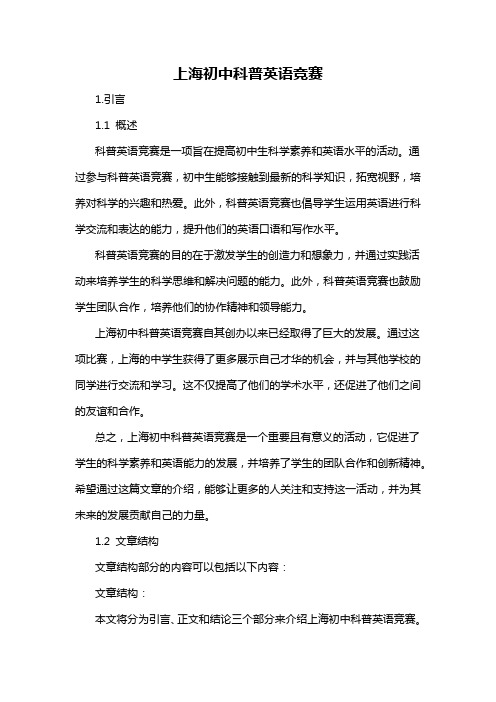
上海初中科普英语竞赛1.引言1.1 概述科普英语竞赛是一项旨在提高初中生科学素养和英语水平的活动。
通过参与科普英语竞赛,初中生能够接触到最新的科学知识,拓宽视野,培养对科学的兴趣和热爱。
此外,科普英语竞赛也倡导学生运用英语进行科学交流和表达的能力,提升他们的英语口语和写作水平。
科普英语竞赛的目的在于激发学生的创造力和想象力,并通过实践活动来培养学生的科学思维和解决问题的能力。
此外,科普英语竞赛也鼓励学生团队合作,培养他们的协作精神和领导能力。
上海初中科普英语竞赛自其创办以来已经取得了巨大的发展。
通过这项比赛,上海的中学生获得了更多展示自己才华的机会,并与其他学校的同学进行交流和学习。
这不仅提高了他们的学术水平,还促进了他们之间的友谊和合作。
总之,上海初中科普英语竞赛是一个重要且有意义的活动,它促进了学生的科学素养和英语能力的发展,并培养了学生的团队合作和创新精神。
希望通过这篇文章的介绍,能够让更多的人关注和支持这一活动,并为其未来的发展贡献自己的力量。
1.2 文章结构文章结构部分的内容可以包括以下内容:文章结构:本文将分为引言、正文和结论三个部分来介绍上海初中科普英语竞赛。
其中引言部分将概述本文内容、介绍文章结构以及明确文章的目的。
正文部分将探讨科普英语竞赛的意义和上海初中科普英语竞赛的历史与发展。
结论部分将总结对初中生的影响,并展望未来科普英语竞赛的发展。
引言部分:在引言部分,我们将对上海初中科普英语竞赛进行介绍,包括其目的和组织形式等。
首先,我们将概述本文的内容,明确文章的结构,并简要介绍每个部分的内容。
接着,我们将介绍文章的目的,即探讨上海初中科普英语竞赛的意义和其对初中生的影响。
通过对这一竞赛的深入了解,我们可以更好地了解科普英语竞赛在初中教育中的作用,促进学生的科学素养和英语能力的提升。
正文部分:在正文部分,我们将详细探讨上海初中科普英语竞赛的意义和其历史与发展。
首先,我们将介绍科普英语竞赛的意义,其中包括培养学生的科学素养,提高科学知识的应用能力,加深对科学的理解和兴趣等方面。
上海科普英语竞赛试题
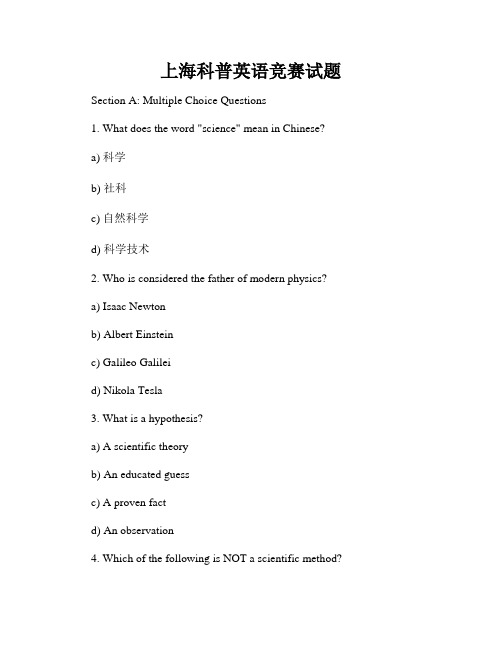
上海科普英语竞赛试题Section A: Multiple Choice Questions1. What does the word "science" mean in Chinese?a) 科学b) 社科c) 自然科学d) 科学技术2. Who is considered the father of modern physics?a) Isaac Newtonb) Albert Einsteinc) Galileo Galileid) Nikola Tesla3. What is a hypothesis?a) A scientific theoryb) An educated guessc) A proven factd) An observation4. Which of the following is NOT a scientific method?a) Observationb) Experimentationc) Deductiond) Speculation5. What is the SI unit for measuring temperature?a) Kelvinb) Celsiusc) Fahrenheitd) NewtonSection B: True or False1. The earth is the center of the universe.2. Inertia is the resistance of an object to a change in its state of motion.3. All living organisms require oxygen for survival.4. Sound travels faster in air than in water.5. The theory of evolution was proposed by Charles Darwin.Section C: Short Answer Questions1. Define the term "photosynthesis."2. Name three renewable sources of energy.3. What is the difference between a physical change and a chemical change?4. Explain the concept of gravity.5. Give an example of an element and a compound.Section D: EssayWrite an essay (at least 500 words) discussing the importance of science in our daily lives. Include examples of how science has improved human life and advanced society.。
上海高中科普英语竞赛
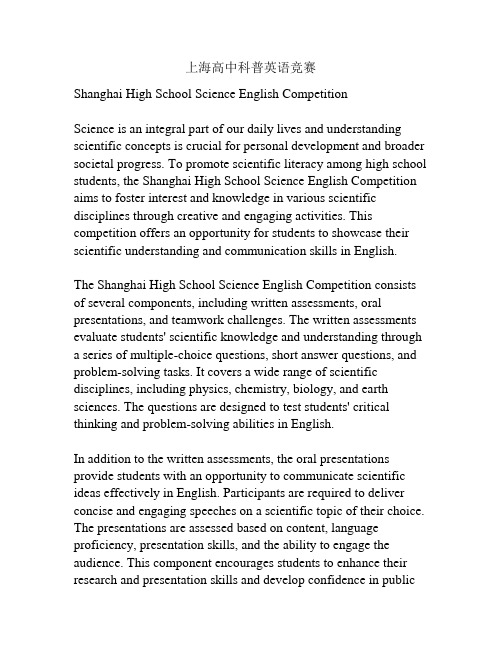
上海高中科普英语竞赛Shanghai High School Science English CompetitionScience is an integral part of our daily lives and understanding scientific concepts is crucial for personal development and broader societal progress. To promote scientific literacy among high school students, the Shanghai High School Science English Competition aims to foster interest and knowledge in various scientific disciplines through creative and engaging activities. This competition offers an opportunity for students to showcase their scientific understanding and communication skills in English.The Shanghai High School Science English Competition consists of several components, including written assessments, oral presentations, and teamwork challenges. The written assessments evaluate students' scientific knowledge and understanding through a series of multiple-choice questions, short answer questions, and problem-solving tasks. It covers a wide range of scientific disciplines, including physics, chemistry, biology, and earth sciences. The questions are designed to test students' critical thinking and problem-solving abilities in English.In addition to the written assessments, the oral presentations provide students with an opportunity to communicate scientific ideas effectively in English. Participants are required to deliver concise and engaging speeches on a scientific topic of their choice. The presentations are assessed based on content, language proficiency, presentation skills, and the ability to engage the audience. This component encourages students to enhance their research and presentation skills and develop confidence in publicspeaking in English.Furthermore, the teamwork challenges aim to foster collaborative problem-solving skills and enhance scientific communication and cooperation among students. Participants are grouped into teams and are presented with real-life scientific scenarios or experiments. They are required to work together to analyze data, propose solutions, and present their findings in English. This component emphasizes the importance of teamwork and cooperation in scientific research and highlights the global nature of science and the need for effective communication across different cultures and languages.To prepare for the competition, students should develop a deep understanding of scientific principles and concepts. They should actively engage in scientific reading materials, such as scientific journals, articles, and books. It is important for students to understand the scientific terminology in English and be familiar with scientific literature to effectively communicate their ideas and findings. Additionally, practicing English communication skills, such as participating in science debates or group discussions, can help students improve their scientific communication abilities in English.Participating in the Shanghai High School Science English Competition can provide numerous benefits for students. It not only nurtures their scientific curiosity and deepens their understanding of scientific concepts but also fosters their English language skills and develops their critical thinking and problem-solving abilities. Moreover, this competition provides anopportunity for students to connect with like-minded peers and experts in the scientific community and to gain recognition for their scientific achievements.In conclusion, the Shanghai High School Science English Competition plays a crucial role in promoting scientific literacy and English language skills among high school students in Shanghai. By assessing students' scientific knowledge, communication abilities, and teamwork skills, this competition encourages students to delve into scientific subjects, develop effective scientific communication skills in English, and foster collaborative problem-solving abilities.。
上海市高中学生科普英语竞赛获奖文章
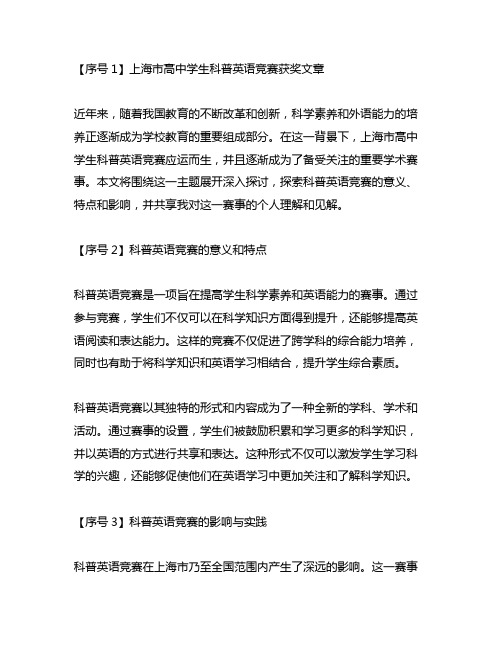
【序号1】上海市高中学生科普英语竞赛获奖文章近年来,随着我国教育的不断改革和创新,科学素养和外语能力的培养正逐渐成为学校教育的重要组成部分。
在这一背景下,上海市高中学生科普英语竞赛应运而生,并且逐渐成为了备受关注的重要学术赛事。
本文将围绕这一主题展开深入探讨,探索科普英语竞赛的意义、特点和影响,并共享我对这一赛事的个人理解和见解。
【序号2】科普英语竞赛的意义和特点科普英语竞赛是一项旨在提高学生科学素养和英语能力的赛事。
通过参与竞赛,学生们不仅可以在科学知识方面得到提升,还能够提高英语阅读和表达能力。
这样的竞赛不仅促进了跨学科的综合能力培养,同时也有助于将科学知识和英语学习相结合,提升学生综合素质。
科普英语竞赛以其独特的形式和内容成为了一种全新的学科、学术和活动。
通过赛事的设置,学生们被鼓励积累和学习更多的科学知识,并以英语的方式进行共享和表达。
这种形式不仅可以激发学生学习科学的兴趣,还能够促使他们在英语学习中更加关注和了解科学知识。
【序号3】科普英语竞赛的影响与实践科普英语竞赛在上海市乃至全国范围内产生了深远的影响。
这一赛事为学生提供了一个展示自己科学素养和英语能力的舞台,激发了学生对科学与英语的热爱和兴趣。
另科普英语竞赛也促进了学校在课程设置和教学方法上的变革,更加注重跨学科能力的培养和科学素养的提升。
在实际的竞赛过程中,学生们需要通过阅读、思考和写作来展现自己对科学知识的理解和应用,并用英语语言进行表达。
这样的实践不仅提升了学生的学术水平,还培养了他们的逻辑思维和语言表达能力。
这种综合能力的培养对于学生未来的学习和发展具有重要意义。
【序号4】个人观点和理解我对于科普英语竞赛有着很深的认识和理解。
我认为这样的赛事不仅是一种比赛,更是一种学习和交流的机会。
通过参与竞赛,我能够更深入地了解科学知识,并在英语表达方面得到提升。
我深刻体会到,科学和英语并不是两个独立的学科,而是可以相互结合和促进的。
而科普英语竞赛正是让我更加深刻地体会到了这一点。
上海高中生科普英语资料竞赛 -回复

上海高中生科普英语资料竞赛-回复Science Popularization in ChinaIntroduction:Science popularization plays a crucial role in fostering scientific literacy and promoting social progress. In recent years, China has made remarkable achievements in popularizing science education among high school students. This article aims to shed light on the efforts made by Shanghai to promote science popularization among high school students, particularly through a science English competition.1. Role of Science Popularization:Science popularization is vital for the overall development of a nation. It helps students to understand and appreciate the principles and applications of scientific knowledge, thereby fostering critical thinking and problem-solving skills. Science popularization also nurtures scientific talents and is crucial for innovation and technological advancements.2. Science Popularization in China:In recent years, China has recognized the significance of sciencepopularization and made substantial efforts to promote it. The government has initiated various policies, programs, and campaigns to engage students in science education. Science popularization has become an integral part of China's national curriculum, with an emphasis on hands-on experiments, scientific research, and learning through exploration.3. Shanghai’s Efforts in Science Popularization:3.1 The Science English Competition:In Shanghai, the Science English Competition plays a pivotal role in promoting science popularization among high school students. This annual event provides a platform for students to showcase their scientific knowledge and English proficiency, enhancing their understanding of science terminology and concepts. The competition comprises written tests, presentations, and group discussions, enabling participants to demonstrate their scientific thinking and communication skills.3.2 Collaborations with Research Institutes:To further integrate science education with practical applications, Shanghai's education department collaborates with research institutes. This collaboration allows students to gain hands-onexperience in scientific research and motivates them to explore the frontiers of science. Students have opportunities to work with scientists, participate in research projects, and benefit from mentorship programs, fostering their enthusiasm and interest in scientific pursuits.3.3 Resource Centers and Museums:Shanghai boasts several science resource centers and museums that offer interactive exhibitions, educational workshops, and science-related events. These centers provide an immersive learning environment for students, enabling them to engage with scientific phenomena and principles in a fun and interactive manner. Through hands-on experiments and interesting demonstrations, the centers facilitate a deeper understanding of scientific concepts and inspire curiosity among students.4. Impact of Science Popularization:The efforts made by Shanghai in science popularization have resulted in significant outcomes. Firstly, an increasing number of high school students are pursuing science-related subjects, contributing to the overall improvement in scientific literacy in Shanghai. Secondly, student participation in scientific research hassignificantly increased, leading to innovative and diverse research projects. Lastly, the Science English Competition has cultivated a strong interest in science and English language skills among students, nurturing a new generation of science communicators.Conclusion:Science popularization is an essential aspect of education in Shanghai. The Science English Competition, collaborations with research institutes, and the availability of resource centers and museums contribute to the overall success in promoting science among high school students. The efforts made by Shanghai have not only enhanced scientific literacy but also nurtured young talents who will play a critical role in China's future scientific advancements.。
2023年上海小学考证和竞赛信息大全

上海小学考证和竞赛信息大全剑桥1.2.3级考试每年旳3月、9月旳第四个星期6为剑桥1.2.3级考试日。
剑桥少儿英语考试包括三个关键旳级别:一级(Starters)、二级(Movers)和三级(Flyers)。
由于最高旳级别Flyers旳语言水平大概相称于剑桥主体考试旳KET, 因此它可以作为长大后来通向KET或迈向PET旳桥梁。
剑桥少儿英语考试一级(Starters): 一级:适合6-8岁, 通过大概100小时旳英语学习, 掌握近400个词汇旳学生参与;剑桥少儿英语考试二级(Movers): 二级:适合8-11岁, 通过大概175小时旳英语学习, 掌握约600个词汇旳学生参与;剑桥少儿英语考试三级(Flyers): 三级:适合9-12岁, 通过大概250小时旳英语学习, 掌握约1000个词汇旳学生参与。
在中国由于考生旳语言背景与其他国家旳差异, 剑桥少儿英语考试旳年龄段扩展到6-12岁甚至更广。
不管参与过多少课时旳训练, 具有什么样旳基础, 都可以参与考试。
《全国公共英语等级考试合格证书》PETS旳考试日上六个月: 每年3月旳第2个周六、周日, 是1-B.1.2.3.4级旳考级日, 笔试(含听力)是周六上午;口试是周六下午、周日全天。
下六个月: 每年9月旳第2个周六、周日, 是1.2.3.4级旳考级日, 笔试(含听力)是周六上午;口试是周六下午、周日全天。
合格成绩及查询措施PETS: 笔试(合听力)按100分制计分, 60分以上为合格;口试按5分制计分, 3分以上为合格。
考试结束后两个月, 考生可通过声讯台查询成绩: 1605782;16898201。
全国统一号码: 16897026上海市通用少儿英语口语星级考试星级考试将本来旳铜、银、金章调整为一、二、三星级, 并在此基础上新开设四星级考试, 以引导青少年向更高旳交际英语水平冲刺, 由少儿英语逐渐向成人英语过渡。
星级考试秉承了通用少英语口语考试一贯旳老式, 仍延用游戏化、情景化、活动化旳新型考试形式。
建平中学西校2009年度第一学期教师获区级以上荣誉一览
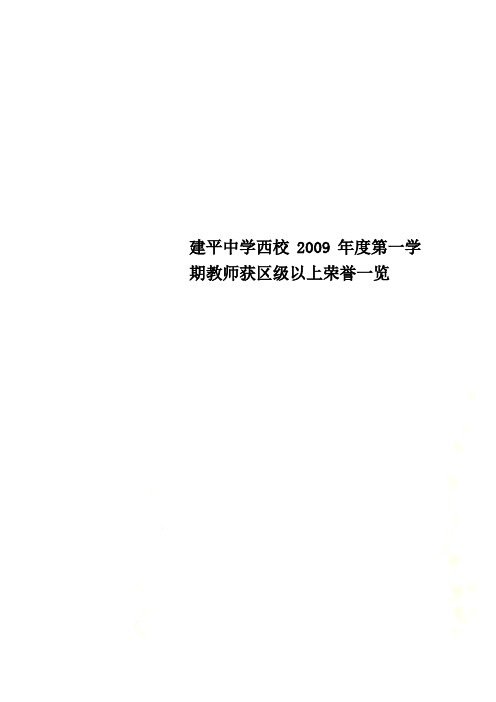
建平中学西校2009年度第一学期教师获区级以上荣誉一览建平中学西校2009年度第一学期教师获区级以上荣誉一览时间对象比赛或论文名称等级主办单位登记时间2009 潘德怀念开国总理周因来全国书画邀请赛优秀金奖北京红旗飘飘文化传播中心2009.112009.1 毛移民《反思学习方法建立错题档案》发表新闻晚报_升学周刊B2_2009.10.162009.112009.2 张航《推开这扇窗——在作文教学中培养学生关注社会的视角》发表浦东教育研究2009年第1期P372009.32009.3 万兆云《分步夯实基础知识》发表《新闻晚报》2009.3.29 B6升学周刊——初三2009.32009.7 印霞芬上海市浦东新区2009年学校体育工作先进个人浦东新区中小学生体育协会、浦东新区中小学幼儿教师奖励基金会2009.102009.9 金伟红2009年浦东新区暑期工作先进个人浦东新区学生假期活动办公室2009.92009.9 陈芳2009年浦东新区中青年教师教学设计评比(中学语文学科)二等奖浦东新区教育学会、浦东教发院教研部2009.102009.9 李竞2009年浦东新区中青年教师教学设计评比(中学语文学科)二等奖浦东新区教育学会、浦东教发院教研部2009.102009.9 杨铭2009年浦东新区中青年教师教学设计评比(中学语文学科)二等奖浦东新区教育学会、浦东教发院教研部2009.102009.9 党晓辉2009年浦东新区中青年教师教学设计评比(中学物理学科)三等奖浦东新区教育学会、浦东教发院教研部2009.122009.9 丁月红2009浦东新区园丁奖园丁奖浦东新区社会发展局,浦东新区中小学幼儿教师奖励基金会2009.112009.9 李竟2009年“浦东新区中青年教师教学设计”中学语文二等奖浦东新区教育学会浦东教育发展研究院2009.112009.9 孙永香2007-2008学年区加强义务教育学校师资队伍建设工作先进个人教育局2009.112009.9 黄颖华2009年浦东新区青年教师教学设计评比一等奖教发院2009.112009.9 陈芳2009年浦东新区青年教师教学设计评比二等奖教发院2009.112009.9 李竟2009年浦东新区青年教师教学设计评比二等奖教发院2009.112009.10 潘德首届中国“幽兰赋杯”书画展览书法类,授“中国翰墨艺术精英”荣誉称号金奖首届中国幽兰赋杯书画展览组委会2009.112009.10 毛移民第三届浦东教育展示周执教《相似三角形复习》优质展示课浦东教育发展研究院2009.112009.11 张斌第十届广茂达杯中国智能机器人大赛机器人灭火指导一等奖中国人工智能学会,中国教育技术协会,中国教育学会中小学劳技教育委员会,中国智能机器人大赛组委会2009.112009.11 张斌第十届广茂达杯中国智能机器人大赛机器人足球指导二等奖中国人工智能学会,中国教育技术协会,中国教育学会中小学劳技教育委员会,中国智能机器人大赛组委会2009.112009.11 丁月红2009年浦东新区骨干后备教师研修班优秀学员浦东教育发展研究院2009.112009.11 谢利君2012上海市“湖南。
上海市进才实验中学第六届科技节活动策划
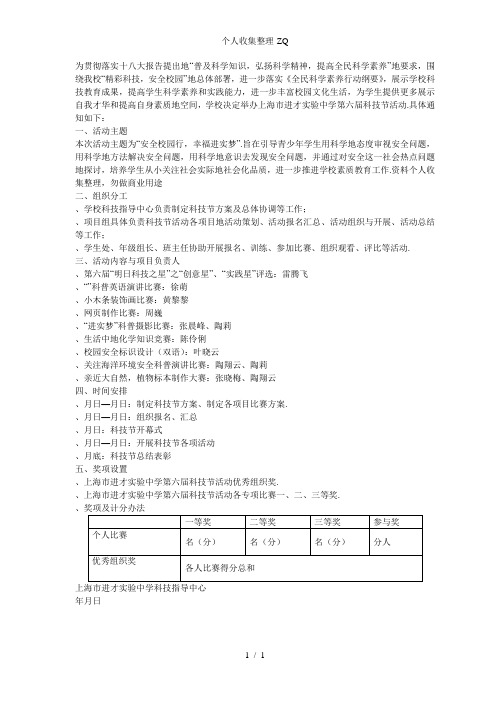
个人收集整理-ZQ为贯彻落实十八大报告提出地“普及科学知识,弘扬科学精神,提高全民科学素养”地要求,围绕我校“精彩科技,安全校园”地总体部署,进一步落实《全民科学素养行动纲要》,展示学校科技教育成果,提高学生科学素养和实践能力,进一步丰富校园文化生活,为学生提供更多展示自我才华和提高自身素质地空间,学校决定举办上海市进才实验中学第六届科技节活动.具体通知如下:一、活动主题本次活动主题为“安全校园行,幸福进实梦”.旨在引导青少年学生用科学地态度审视安全问题,用科学地方法解决安全问题,用科学地意识去发现安全问题,并通过对安全这一社会热点问题地探讨,培养学生从小关注社会实际地社会化品质,进一步推进学校素质教育工作.资料个人收集整理,勿做商业用途二、组织分工、学校科技指导中心负责制定科技节方案及总体协调等工作;、项目组具体负责科技节活动各项目地活动策划、活动报名汇总、活动组织与开展、活动总结等工作;、学生处、年级组长、班主任协助开展报名、训练、参加比赛、组织观看、评比等活动.三、活动内容与项目负责人、第六届“明日科技之星”之“创意星”、“实践星”评选:雷腾飞、“”科普英语演讲比赛:徐萌、小木条装饰画比赛:黄黎黎、网页制作比赛:周巍、“进实梦”科普摄影比赛:张晨峰、陶莉、生活中地化学知识竞赛:陈伶俐、校园安全标识设计(双语):叶晓云、关注海洋环境安全科普演讲比赛:陶翔云、陶莉、亲近大自然,植物标本制作大赛:张晓梅、陶翔云四、时间安排、月日—月日:制定科技节方案、制定各项目比赛方案.、月日—月日:组织报名、汇总、月日:科技节开幕式、月日—月日:开展科技节各项活动、月底:科技节总结表彰五、奖项设置、上海市进才实验中学第六届科技节活动优秀组织奖.、上海市进才实验中学第六届科技节活动各专项比赛一、二、三等奖.上海市进才实验中学科技指导中心年月日1 / 1。
- 1、下载文档前请自行甄别文档内容的完整性,平台不提供额外的编辑、内容补充、找答案等附加服务。
- 2、"仅部分预览"的文档,不可在线预览部分如存在完整性等问题,可反馈申请退款(可完整预览的文档不适用该条件!)。
- 3、如文档侵犯您的权益,请联系客服反馈,我们会尽快为您处理(人工客服工作时间:9:00-18:30)。
关于举办上海市第五届小学生科普英语游戏竞赛活动的通知
上海市各中小学:
上海市青少年科技教育中心将于2007年9月至2008年4月举办上海市第五届小学生科普英语游戏竞赛,现将活动具体事宜通知如下:
一、活动宗旨
上海市小学生科普英语游戏竞赛是在上海市中学生科普英语竞赛发展基础上的拓展活动,秉承“拓宽学生视野,提高科学素养,综合应用英语”的活动宗旨,坚守严谨、公正的竞赛品质。
小学生科普英语游戏竞赛将英语学习、科学知识与趣味游戏融为一体,使英语教学与科普教育互为载体,以有趣的科普知识、丰富的科学信息及多样的趣味游戏激发小学生学习英语的兴趣,提高科学素养与英语学习的水平和能力。
二、组织机构
主办单位:上海市青少年科技教育中心
协办单位:上海市各区、县少科站(青少年活动中心)
支持单位:世纪出版集团少年儿童出版社《少年科学》杂志社
三、参赛对象
在校小学四、五年级学生,以及中学六年级(预初)学生;
注:小学参赛学生与中学六年级参赛学生分组进行,并分设奖项。
四、竞赛报名
以集体报名为原则,2007年9月28日—10月19日,由学校团体向各区、县少科站(青
少年活动中心)报名,10月20日—10月31日由各区、县少科站(青少年活动中心)将报名情况汇总后向市青少年科技教育中心报名。
五、竞赛内容
1、活动资料:
为提高学生学习英语的兴趣,扩大英语词汇量,在英语学习的氛围中了解科学、热爱科学,并便于学生参加竞赛活动,竞赛主办单位将提供《上海市第五届小学生科普英语阅读文选》(少年儿童出版社出版)、《上海市第五届小学生科普英语阅读文选扩充资料》(少年儿童出版社出版;六年级参赛学生使用,也可供其他年级学生选择使用)、《上海市小学生科普英语游戏竞赛活动练习手册》。
《上海市第五届小学生科普英语阅读文选》:图文并茂,涵盖了动物、人体、气象、地理、心理等多项科普内容,内容丰富生动,并配有多种有趣的游戏活动、简要讲解及技能练习,可供学生进行拓展性学习或教师开展拓展性课程。
《上海市第五届小学生科普英语阅读文选补充资料》:由竞赛主办单位组织编写,为六年级参赛学生的补充阅读资料。
资料精心选择15篇短文,配有生词注释、语法讲解、信息拓展、小小练习等几大内容版块。
学有余力的四、五年级参赛学生也可根据实际学习需要,选择使用。
《上海市小学生科普英语游戏竞赛活动练习手册》:内含历年小学生科普英语竞赛活动的初赛、复赛、决赛题目。
可供学生在趣味的题目中,扩大阅读量和知识量,掌握技能,培养思考能力。
每位参赛学生(四、五年级)缴纳竞赛资料成本费用25元;每位六年级参赛学生缴纳竞赛资料成本费用30元。
另外,竞赛主办单位提供《上海市第五届小学生科普英语阅读文选配套CD 声碟》(定价10元),学生可根据需要在竞赛报名时登记购买。
2、竞赛进程与内容
1)初赛:
初赛由竞赛主办单位组织统一命题,由学校组织学生开展竞赛及游戏活动,竞赛形式为笔试。
竞赛内容的70%取自《上海市第五届小学生科普英语阅读文选》(以下简称《阅读文选》);六年级组学生竞赛,除需完成小学竞赛卷外,另需完成加试题部分,加试题部分内容的70%取自《上海市第五届小学生科普英语阅读文选补充资料》(以下简称《补充资料》)。
各学校选拔初赛成绩居前20%的学生参加区县级复赛。
2、复赛:
复赛由竞赛主办单位组织统一命题,分区、县举行,竞赛形式为笔试,竞赛内容的50%取自《阅读文选》);六年级组学生竞赛,除需完成小学竞赛卷外,另需完成加试题部分,加试题部分内容的50%取自《补充资料》。
各区县选拔本区县复赛成绩居前15%的学生参加决赛。
3、决赛:
决赛由全市统一组织进行,竞赛形式为笔试(含听力部分)。
笔试内容的30%取自《阅读文选》;六年级组学生竞赛,除需完成小学竞赛卷外,另需完成加试题部分,加试部分内容的30%取自《补充资料》。
竞赛结果根据决赛成绩分组评出学生个人一、二、三等奖。
五、竞赛奖励:
1、分小学和中学组,设学生个人一、二、三等奖若干名,颁发证书及奖品。
2、分小学和中学组,设学校团体一、二、三等奖若干,颁发奖状或奖牌。
学校团体奖的评分依据:参赛分(学校实际参赛人数,每个学生0.5分)+ 本校参加决赛的前三名学生成绩分。
3、设区县团体优秀组织奖若干,发给奖状或奖牌。
区县团体奖的评分依据:参赛分(区县实际参赛人数,每个学生0.2分)+ 本区县参
加决赛的前十名学生成绩分。
六、本规程修改和解释权属本届竞赛主办单位。
上海市青少年科技教育中心
2007年9月。
